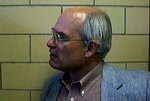Here is the first of what we hope will prove to be a very short list of errata.
Shawn Powell of Casper College wrote:
"I have a question on a formula and significance test results shown on page 286. What was the df for MS residual and the number of levels of the IV used to arrive at the probability figures near the bottom of the page. Using the charts provided on pages 449 and 450 (which by the way are shown as "-" in the text on page 286) I used a df of 18 and an IV level of 2 and arrived at .05 = 2.97 and .01 = 4.07. If this is correct then the values to the right of the formula don't match up with the results shown."
Chris Spatz responded:
"To determine correct HSD critical values, the number of levels of the IV is the number in the original ANOVA problem rather than the number in the HSD test. Thus, for the HSD tests on page 286, the number is 3 and not the 2 in the HSD test. I'm afraid that our last paragraph on the page really needs some improving. Our only clue to you to use 3 is the word ANOVA. Upon re-reading, it is clear that the insertion of the numbers needed for the critical values (df = 18 and number of levels = 3) would improve the communication of what we actually did."
In addition, there is a typographical error in the last paragraph of page 286. The first two sentences should read:
"To interpret HSD values, use Table C.5 in appendix C. Critical values for alpha = .05 are on page 449 (missing page number in original); those for alpha = .01 are on page 450 (missing page number in the original)."
Our thanks to Dr. Powell and his sharp eyes. If anyone else spots similar issues please contact us.
Saturday, January 12, 2008
Monday, January 7, 2008
NHST
On page 169 in an In the Know box, we briefly discuss the history and current status of null hypothesis statistical testing (NHST). Naturally, we still teach NHST basics but we also emphasize newer methods such as exploring the data and using confidence intervals.
So, it was interesting to find what Irene Pepperberg had to say about NHST. You may recall Dr. Pepperberg as the psychologist who found and trained Alex, the African gray parrot, to communicate using a limited vocabulary. (See the earlier blog entry, "You be good, see you tomorrow..." where we covered Alex's death.)
Pepperberg was one of 165 scientists and others who had responded to Edge's 2008 question: What have you changed your mind about? Why? In her reply, she said she had changed her mind about NHST (although she does not refer to it as NHST, she calls it "the classic scientific method.")
She gives three reasons for her change of mind. The first is that she now realizes the importance of observation before forming testable hypotheses. The second is that some important and interesting questions about psychology do not lend themselves to easy conversion to testable hypotheses. The third is that she believes too many scientists, because of their methods training, end up seeking to prove hypotheses rather than testing them.
Here is the link to her full response.
Also, here are links to responses by other psychologists to the same question: David Buss, Howard Gardner, Diane Halpern, Daniel Kahneman, Stephen Kosslyn, and Martin Seligman. Many other scientists, thinkers, and celebrities also responded.
So, it was interesting to find what Irene Pepperberg had to say about NHST. You may recall Dr. Pepperberg as the psychologist who found and trained Alex, the African gray parrot, to communicate using a limited vocabulary. (See the earlier blog entry, "You be good, see you tomorrow..." where we covered Alex's death.)
Pepperberg was one of 165 scientists and others who had responded to Edge's 2008 question: What have you changed your mind about? Why? In her reply, she said she had changed her mind about NHST (although she does not refer to it as NHST, she calls it "the classic scientific method.")
She gives three reasons for her change of mind. The first is that she now realizes the importance of observation before forming testable hypotheses. The second is that some important and interesting questions about psychology do not lend themselves to easy conversion to testable hypotheses. The third is that she believes too many scientists, because of their methods training, end up seeking to prove hypotheses rather than testing them.
Here is the link to her full response.
Also, here are links to responses by other psychologists to the same question: David Buss, Howard Gardner, Diane Halpern, Daniel Kahneman, Stephen Kosslyn, and Martin Seligman. Many other scientists, thinkers, and celebrities also responded.
Subscribe to:
Comments (Atom)


